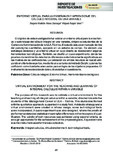| dc.rights.license | http://creativecommons.org/licenses/by-nc-sa/3.0/ve/ | |
| dc.contributor.author | Mora Z., Ángela M. | |
| dc.contributor.author | Vera, Miguel Angel | |
| dc.date.accessioned | 2011-04-27T20:47:16Z | |
| dc.date.available | 2011-04-27T20:47:16Z | |
| dc.date.issued | 2010-12-31 | |
| dc.identifier.issn | 1960-9712 | |
| dc.identifier.uri | http://www.saber.ula.ve/handle/123456789/32925 | |
| dc.description.abstract | El objetivo de esta investigación fue validar un entorno virtual para la enseñanza
y aprendizaje del cálculo integral en una variable, dirigido a estudiantes de la
Carrera de Administración de la ULA-Táchira. El estudio estuvo enmarcado dentro
del paradigma cuantitativo, apoyado en un estudio de campo. Se elaboró una
estrategia didáctica y un entorno virtual en cuyo diseño se incorporaron algunas
herramientas tecnológicas. También, se diseñó un cuasi-experimento donde las
pruebas de rendimiento detectaron diferencias estadísticamente significativas en
las medias de las calificaciones. La validación de ambos recursos se realizó utilizando
el criterio de expertos, mediante una variante del método Delphi, quienes los
calificaron como bastante adecuados para el logro de los objetivos propuestos. El
instrumento de recolección de datos utilizado fue el cuestionario. | es_VE |
| dc.language.iso | es | es_VE |
| dc.publisher | SABER-ULA | es_VE |
| dc.rights | info:eu-repo/semantics/openAccess | |
| dc.subject | Cálculo Integral | es_VE |
| dc.subject | Entorno virtual | es_VE |
| dc.subject | Herramientas tecnológicas | es_VE |
| dc.title | Entorno virtual para la enseñanza y aprendizaje del cálculo integral en una variable | es_VE |
| dc.title.alternative | Virtual environment for the teaching and learning of integral calculus within a variable | es_VE |
| dc.type | info:eu-repo/semantics/article | |
| dc.description.abstract1 | The purpose of this research was to validate a virtual environment, for the
teaching and learning of integral calculus within a variable; directed towards the
students of the Management Career at ULA – Táchira. This studio was framed
with the qualitative approach, supported in a study field. A didactic strategy and a
virtual environment were created in whose design, some technological tools
were incorporated. A quasi-experiment was also designed, where the proofs of
performance detected statistical meaningful differences in the measures of qualification.
The validity of both resources was achieved using experts' criteria, as
enough appropriate for the achievement of the proposed goals. A questionnaire
was the instrument used for the data collection. | es_VE |
| dc.description.colacion | 67-82 | es_VE |
| dc.description.email | ammzuluaga@yahoo.com | es_VE |
| dc.description.email | miguelvera@cantv.net | es_VE |
| dc.description.frecuencia | semestral | |
| dc.identifier.depositolegal | 200402TA1703 | |
| dc.publisher.pais | Venezuela | es_VE |
| dc.subject.facultad | Núcleo Táchira (NUTULA) | es_VE |
| dc.subject.keywords | Integral calculus | es_VE |
| dc.subject.keywords | Virtual environment | es_VE |
| dc.subject.keywords | Technological tools | es_VE |
| dc.subject.publicacionelectronica | Revista Evaluación e Investigación | |
| dc.subject.seccion | Revista Evaluación e Investigación: Reporte de Investigaciones | es_VE |
| dc.subject.thematiccategory | Artes y Humanidades | es_VE |
| dc.subject.tipo | Revistas | es_VE |
| dc.type.media | Texto | es_VE |


